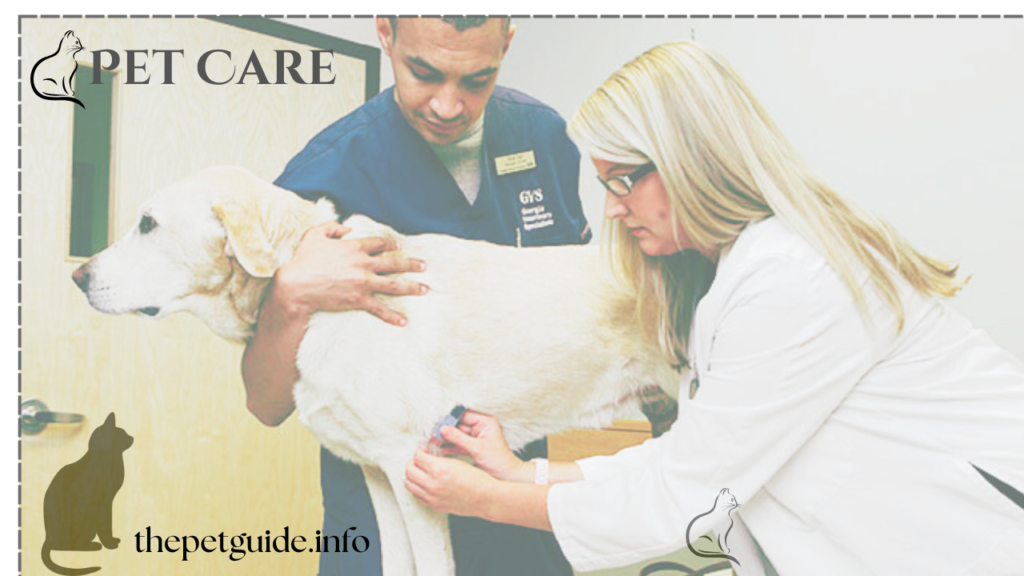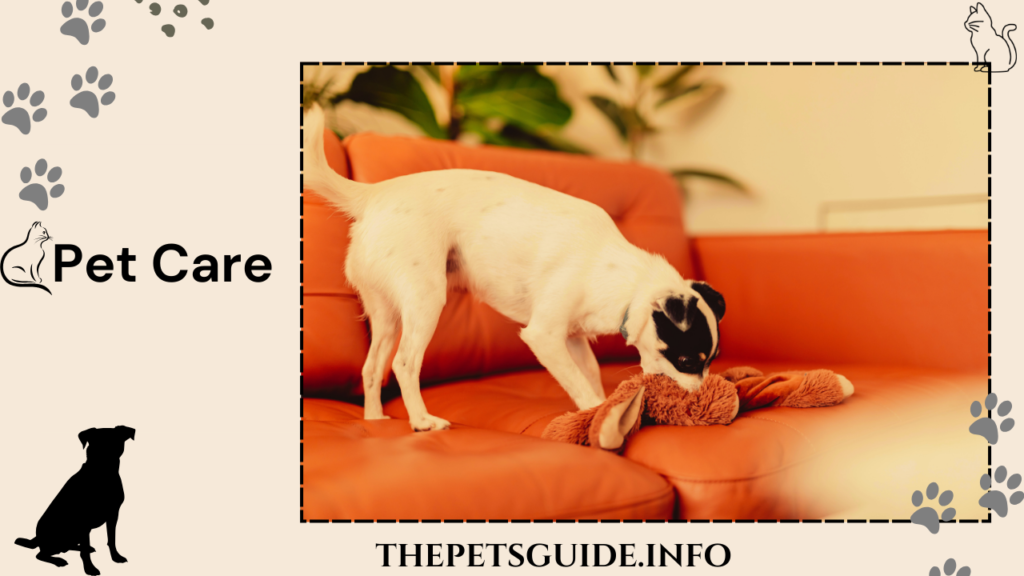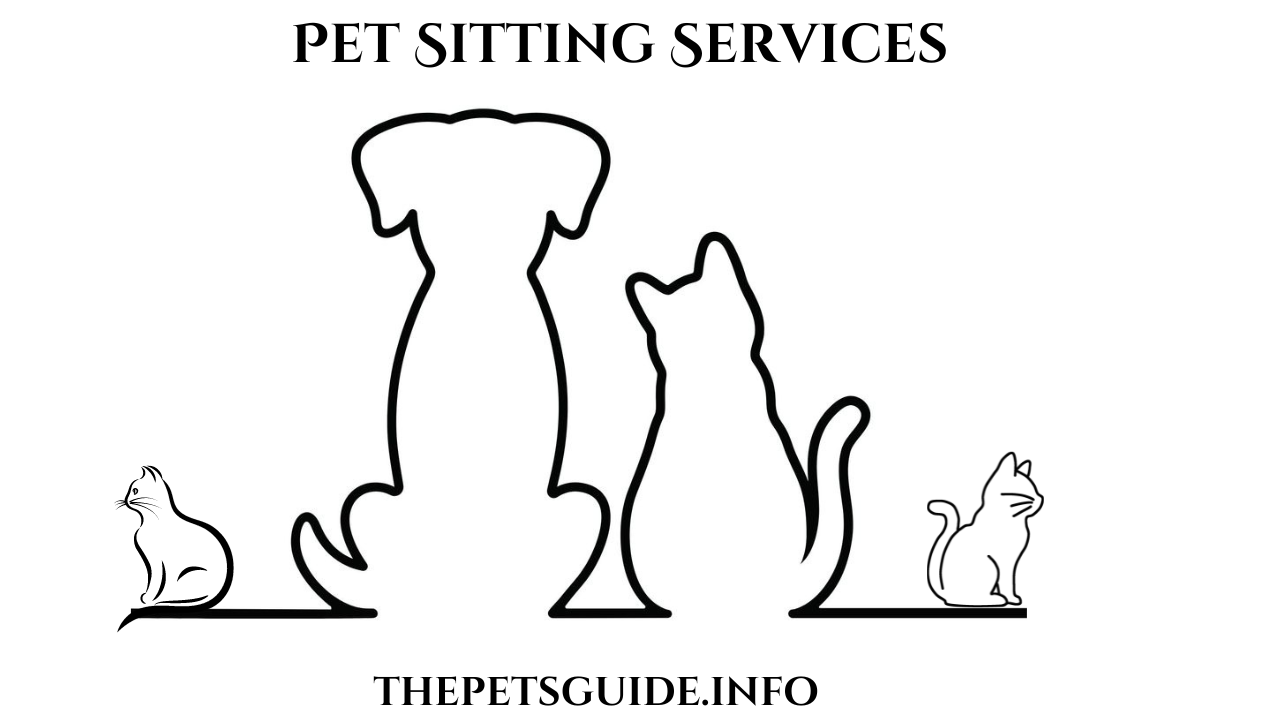
Providing a pet with an ample amount of wholesome food and uncontaminated water on a daily basis is part of pet care. In addition, it’s critical to provide them with secure habitat, lots of stimulation, and exercise. Regular veterinary check-ups and prophylactic treatment are essential for maintaining your pet’s health.

Use these ten responsible pet care tips year after year for a lifetime of happy and healthy cats and dogs. In order to keep your pet happy and healthy, as a pet parent, you want to take every precaution possible. This includes engaging in routine, daily activities.
Pet Care Tips:
The best pet care tips are:
- Veterinarian Visits
- Vaccination
- Proper Identification
- Spaying/Neutering
- Healthy Food
- At Home Care
- Training and Socializing
- Following Dog Perak Rules
- Safe Playtime
- Prevent Parasites
- Pets Need Dental Care, Too
- Never Give Pets People Medication
- Proper Restraint in a Vehicle
Veterinarian:
One of the best pet care advices is to visit a veterinarian. Visiting the vet on a regular basis is the first step towards responsible pet ownership. Your dog or cat should have a checkup at least once or twice a year because of their shorter lifespan than that of humans. Your pet may visit the vet more regularly when they’re younger, depending on their immunization schedule, but as they become older, going to the vet is necessary to develop and maintain good pet health.
One essential part of appropriate pet care is vaccinating your animals. Make an immunization appointment as soon as you bring your new pet home. In order to safeguard your young puppy or kitten against sickness and injury, the veterinarian will establish an immunization program during your initial appointment. Puppy vaccinations should begin as soon as possible in the first few weeks after you bring him home.

When you make your initial appointment, discuss with your veterinarian the best time to book that visit. Distemper, Lyme disease, and rabies are among the illnesses they aid in preventing. Vaccines against feline herpes virus, feline leukemia, and rabies are beneficial for cats. Verify the immunization status of any adult or senior animal you have adopted. Indeed, vaccinations must be renewed.
Vet visits may be, well, difficult at times. There are ways to lessen stress for both of you, even if cats, in particular, may not like to leave the comforts of their home. It’s best to start your cat off in her carrier when she’s a kitten to prevent the running away and hiding under the bed issue.
A veterinarian’s advice is among the best when it comes to pet care. Enjoy joyrides with your dog to help him link getting into the car with visiting the veterinarian. Furthermore, if you select a veterinarian who is a good fit for your pet, most pets don’t dislike seeing the doctor.
Vaccination:
Vaccination is a best pet care tip. Vaccinating your pets is a vital component of responsible pet care. Soon after welcoming your new pet into your home, schedule an immunization appointment. During your first visit, the vet will set up an immunization schedule for your little pup or kitten to protect them from illness and disease. Vaccinations for puppies should happen early in your puppies first few weeks after you bring him home.

Talk to your vet at your first appointment, on when a good time to schedule that visit. They help prevent diseases such as rabies, Lyme disease, and distemper. Cats benefit from vaccines that prevent feline herpes virus, feline leukemia, and rabies. If you’ve adopted an adult or senior animal, make sure they are immunized, too. Vaccinations do need renewal and aren’t just for young pets.
Proper Identification:
Proper identification is best pet care tip. Having appropriate identification is essential to a happy ending if the unimaginable occurs and your child goes lost—young children in particular are prone to running out the door.
Your pet gets an implant under the skin called a microchip, which is an electrical device around the size and shape of a grain of rice that can be scanned by a scanner to get your personal data. When combined, these identifying methods can help bring you and your cherished companion back together, but only if you keep up-to-date contact information.
Your pet gets an implant under the skin called a microchip, which is an electrical device around the size and shape of a grain of rice that can be scanned by a scanner to get your personal data. When combined, these identifying methods can help bring you and your cherished companion back together, but only if you keep up-to-date contact information.
Commence with the essentials: a secure collar and a tag bearing all of your contact details. To ensure that your pet never loses its collar, microchipping is advised in addition to an ID tag, your contact information. In addition to an ID tag, microchipping your pet is advisable, because there’s always the chance a collar will fall off.
Implanted beneath your pet’s skin, the microchip is an electrical device around the size and shape of a grain of rice that can be read by a scanner to get your personal data. When combined, these identifying methods can help bring you and your cherished companion back together, but only if you keep up-to-date contact information. If your phone number or address changes, make sure to update the information that is on file with the microchip.
Spaying /Neutering:
Spaying is the best pet care tip. Vaccinating your pet lowers the number of homeless animals and guards against a range of health issues, including difficult pregnancies. By removing your cat’s uterus and ovaries, you can considerably lower her risk of cervical cancer, completely remove the chance of ovarian cancer, and keep her from developing “heat.”
This reduces her likelihood of straying from home in search of a companion and makes any male cats around less aggressive (they won’t spray to indicate their territory, which is good for you and your furniture). In addition to preventing testicular cancer, neutering your dog will help reduce aggression and neighborhood wandering. Your pet will probably need to spend at least one night in the veterinarian’s office for monitoring and recovery because spaying or neutering involves surgery that requires general anesthesia.
Healthy Food:
Healthy food is one of the best pet care tips. Keeping healthy food and clean, cool water available for animals at all times are two interconnected aspects of appropriate pet keeping. By giving your best friend the nutrition and energy they require, the correct pet food will improve their quality of life.
Although there are a lot of meal alternatives available, it can be intimidating at first, but you can quickly become skilled by learning about key ingredients and how they benefit your cat or dog. Look for a proper ratio of protein, carbohydrates, and fats when selecting the best cat food. Along with plenty of fiber for the digestive system, these components are also vital for dog food.
At Home Care:
Taking proper care of your pets at home and at the vet or groomer is your responsibility as their caregiver and it is a best pet care tip. They may be kept in excellent condition by giving them nutritious food, brushing their teeth, and combing their coats. Make time for grooming and hygiene chores on your calendar to ensure that you are providing competent pet care. You may also try combining duties, like giving your pet a calming comb after nail trimming, until they become a regular.
Training and Socializing:
These are best pet care tips. Making sure your cat or dog is well-trained—which includes adequate socialization—is one of the most crucial parts of providing responsible pet care. It’s preferable and most effective to start early, but you can always pick up more skills later on. Any animal you live with should have both potty training and obedience training as their top priorities.
Your dog or kitten will bond better with you and other pets if they learn socializing skills. For advice on reputable trainers in your region or for reading at-home training manuals, speak with your veterinarian or the local animal shelter. A happy pet makes for a happy pet parent, therefore training a pet makes them happy too.
Following Dog Perak Rules:
Playing outside with your dog is a lot of fun, and since dogs are sociable animals, they like having a wonderful outdoor adventure. Follow the guidelines if you choose to bring your dog to a dog park. Bringing your own toys and refraining from bringing food inside are examples of proper dog park etiquette that keep everyone safe, especially when dealing with aggressive or under socialized dogs. Treats for afterwards should be brought along to thank your man for his exemplary behavior.

Safe Playtime:
Playing together is a great way to strengthen relationships between dogs and cats, as is well known. Make a toy inventory. Do they feel secure? Awkward plush toys that present choking risks and sharp, harsh edges that could cut someone should be avoided. It is recommended to replace old, worn-out toys with brand-new ones. Creating homemade dog and cat toys at home is a fantastic, low-cost method to add even more enjoyment to pet ownership.
Prevent parasites:
Pets most frequently contract external parasites, such as fleas, which can cause infections, hot spots, rashes, and irritated skin. Moreover, fleas might give your dog or cat other parasites. The most prevalent internal parasite affecting dogs and cats is tapeworms, which can infect your pet with just one flea swallowed.
Preventing all year long is crucial. In locations where heartworm infection is common, it’s crucial to regularly treat intestinal parasites, fleas, and heartworms.
Pets Need Dental Care, too:
Your pet may experience dental pain, gum disease, and tooth loss just like you. Similar to humans, your pet’s teeth may be kept strong and healthy with frequent brushing and dental cleanings. Many owners never even bother to check in their pets’ mouths, despite the fact that dental disease is one of the most frequent preventable ailments in pets.
By the age of three, over 70% of cats and 80% of dogs are thought to exhibit symptoms of dental illness, which can result in loose teeth, abscesses, and chronic pain. Proper dental care on the part of owners can prevent periodontal disease in addition to routine cleanings by your veterinarian. Dental treats, mouth rinses, and brushing are all part of owner care.
Never Give Pets People Medication:
Pets can die from taking human-made medications. In fact, human medications were among the top 10 pet poisons reported by the ASPCA in 2010.
NSAIDs, such as ibuprofen and naproxen, are the most common cause of pet poisoning; other human medications that might harm pets’ health include acetaminophen, decongestants, antidepressants, and muscle relaxants. Dogs and cats that take human medications may experience cardiac arrest, convulsions, and kidney damage.
Proper Restraint in a Vehicle:
Shouldn’t your pet wear a seatbelt for safety when they are in the car? Unrestrained pets in cars can cause major injuries to both the driver and the animal and are a distraction to both parties. How to transport pets safely
Never let your pet ride in the front seat, where the airbag could burst and cause serious harm or even death. Refrain from allowing dogs to ride in the back of a truck bed unrestrained or with their heads out the window. In the event of an accident, these behaviors put individuals at risk of being ejected from the car.P
FAQS
What is the best way to take care of a pet?
Five best ways of pet care are:
- Give them some time to practice. Just like us, pets can become out of shape when they don’t exercise.
- Spend some time exercising your mind as well.
- Assist with proper dental care at home.
- Examine your pet at least twice a year by a veterinarian.
- Enjoy your pet to the fullest!
How to maintain pet health?
Take your pet on walks. Provide a healthy, well-balanced diet for your pet. To ensure your pet is healthy and to help identify issues early, have your veterinarian inspect them at least once a year. Vaccinate your pet against rabies, panleukopenia, parvo, and other potentially fatal illnesses.
How to treat your pet?
- important pet care tips are as follow:
- Provide them wholesome food.
- Provide them access to clean water.
- Give them a comfortable and secure place to live.
- Pets must also respond to the call of nature.
- Make Certain Your Pets Remain Active.
- Veterinary visits are a necessary component of pet care; spay or neuter your animals.
What is pet hygiene?
through Dr. Al Townshend. The act of upholding one’s health and averting illness, mostly by cleanliness, is what we refer to as hygiene. No exception is made for our pets, whose pleasure and general health are greatly influenced by environmental sanitation and hygiene.
What are the benefits of having a pet care?
Pet can:
- Keeping us company helps us feel less isolated.
- Make us grin and chuckle, as this might improve our mood and reduce tension.
- Comfort us throughout our time of need.
- Motivate us to work out and go outside.
- Give us structure and direction.
How to maintain a dog?
Ensure your dog has a safe and hygiene living set. A decent living requires adequate hygiene and protection from the elements and dangers. Never lose access to fresh water. It’s critical for health and vitality to maintain ideal hydration.
Conclusion:
In addition to ensuring a higher quality of life, proper treatment can prevent common diseases and address health issues quickly. Second, prompt treatment improves the emotional connection that benefits both parties when a pet and its owner. Pets provide company, lower stress levels, and have the potential to enhance mental health for their owners.
In this article, I have discussed 13 best pet care tips. I hope that it will be very beneficial for you. In case of any issues, you can contact us by the link on our website. Thank You
.







